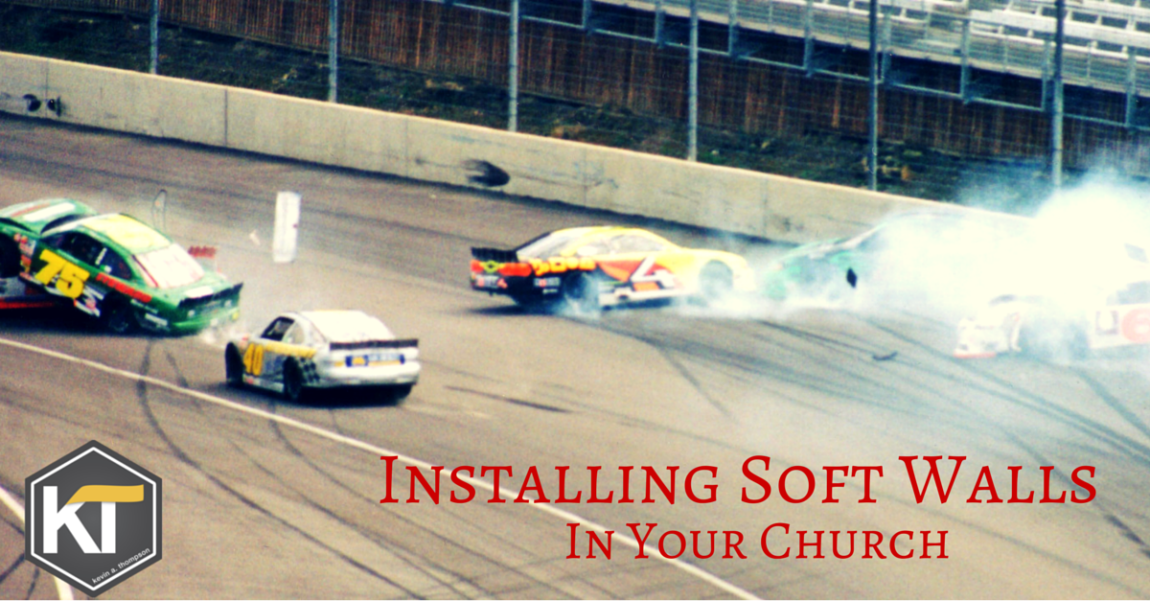The credit should probably go to Dale Earnhardt. While his stubbornness may have cost him his own life, his legendary status forced NASCAR to act when he was tragically killed on the last lap of the 2001 Daytona 500.
Earnhardt was killed instantly as he lost control of his car and it hit the wall at 160 miles per hour. Having its superstar killed in front of millions of people in its biggest race caused NASCAR to double its efforts regarding driver safety. Several major initiatives followed the wreck, but none have been more influential than the development of the SAFER barrier. (See: A Christian Response to an Atheist Billboard)
The SAFER barrier, also known as soft walls, is designed to absorb the energy of the car as it crashes into the wall. While it cannot dissipate all the energy from the car, it can greatly reduce the impact felt by the driver lowering costs of car repairs and, more importantly, protecting drivers from serious injuries.
Nothing can stop a race car from crashing, but the soft wall can lessen the damage of the wreck.
What a soft wall gives to a race track, we should give to others.
The world is full of crashes. Some are meaningless fender-benders and others are unavoidable accidents with fatal results. Sometimes we are innocent bystanders, on other occasions we are rubber-neckers gawking at the pain of others, and too often we are one of the victims enduring the impact.
It doesn’t take many laps around the track of life to figure out that crashes are a part of life. Some we can avoid and others we can’t. Many are of our own decision-making, but whether our fault or not, few people actually intend to wreck.
It just happens. Maybe we were in denial of the natural consequences of our decision-making. Maybe we were ignorant of what would happen. Maybe there was nothing we could do to avoid the outcome.
No matter the cause, all of us crash and when we do, we need something to assist us with the impact.
We need soft walls. (See: You Can’t Prove Jesus)
This is what the church can be to the world. We can provide a safe place to allow your life to crash.
We can’t prevent the crash.
We can’t prevent the damage.
We can’t ensure that your life will ever be the same.
If the crash is going to happen, we can lessen the impact. We can make sure you are not alone. We can assist you in putting your life back together.
This has not always been the church’s strong suit. For many years, and still in many places, the church feels the need to be the hardest concrete wall possible. They want to be part of the blunt trauma people feel when they make bad choices. Some churches even attempt to force crashes which may not be occurring.
But it doesn’t have to be this way. (See: Stop Whining About the Church)
There are many churches which compassionately desire to help people.
We don’t want to deny the truth.
We don’t want to hide bad choices.
We don’t want to protect those perpetrating evil.
But we do want to lessen the damage of human foolishness. We want to ease the pain, bandage the wound, and minimize the bleeding.
Bad choices lead to bad consequences. There is nothing the church can do to change that. An addict must go through withdrawals, a broken marriage must be grieved, and deep loss must be felt. Because the pain of a crash can’t be avoided, there is no need for the church (or anyone else) to make the pain worse. Anyone wanting to recognize the folly of their bad choices will do so.
There is a great need, however, for the church to lessen the impact. We can do that.
We can:
Be a place of tremendous grace. We tell the truth about life, but we don’t judge others or attempt to make them feel bad. In compassion we point people in the right direction. (See: Why Our Church Hosts LGBTQ Funerals)
Be a safe place for hurting people. When you are wounded, you are vulnerable. A healthy church can protect the hurting from additional pain. In a survival-of-the-fittest world, the church can protect the hurting rather than exploit them. It can give people a time to heal.
Be a community focused on healing. While a crash can’t always be prevented, how we respond to the crash determines much of our lives. We can either wallow in our pain or get up and start putting our lives back together. A good church is more about assisting people toward health than rehashing the details of the crash.
The difference between crashing into a concrete wall and a soft wall is telling. The damage done is far less when there is something to minimize the impact. A soft wall doesn’t always prevent injury or death, but it does greatly influence the likelihood of a good outcome.
What a soft wall does for a race track, the church can do for the world.




One Response to Installing Soft Walls in Your Church